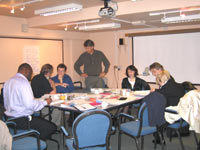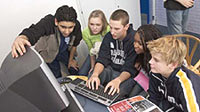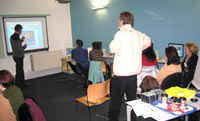Centre for Innovation in Education
 (TEHNE Romania)
(TEHNE Romania)| TEHNE.ro > projects > take part too |
|
Take Part Too - Active Global-Citizens Simulation
The main aim of the TPT project is to empower young people from different European countries to play an active and responsible role as democratic European citizens in the rapidly changing context of our modern learning societies. This aim is supported by the following objectives:
The virtual context provided by the platform to be developed within the project will have a strong impact on enhancing the opportunities for 14 to 18 year old learners to exercise their global citizenship. The young people in the project will look together at ways of defining issues and problems that Europe is facing today, as well as working together to find out the best solutions offered by the democratic process. The simulation activities that will be run through the Internet within the project will enrich teachers' pedagogical knowledge and skills. That will help them in using innovative strategies to meet the common intended goals in education for global citizenship. The content of the simulation activities will stimulate cross-curricular approaches, using and complementing the resources offered by other areas of study, and will call for close cooperation between teachers as well as pupils. The simulation game 'Take Part Too' will be played by 14 to 18 year old learners and their teachers (facilitators) in three different countries. The players in each simulation game are three classes of learners representing each their country. In the pilot-phase the countries are UK, Romania and Denmark. Take Part Too is a web based simulation game that combines facts and fiction off-line and on-line. It provides a proactive way of using knowledge. It consists of a universe of three existing countries and a 'fictional' or virtual Youth Council. The Youth Council consists of all the participants from the three classes. A number of parallel games can take place at the same time. It is possible for the players in one game to follow the proceedings in other games. The simulation starts with a fictive question/proposal/dilemma from the European Parliament concerning e.g. democracy, immigration, consumerism and globalisation or conflict. After research including the European Convention of Human Rights, the learners present results on their national web page, discuss attitudes and put forward plans of action from a youth perspective - in the youth council.
The website will be published and promoted and will be freely available for all to use. The use of it will be encouraged through bodies such as UNESCO Associated School Network, The British Council, The North-South Centre, the ELIT-e Network and Schoolnetglobal.com. There is further potential to involve other countries, particularly EU accession candidate countries and countries from Africa and Asia, and to develop a World Youth Council. The project partners:
More information about this project can be found at: |
| TEHNE.ro > projects > take part too |
| © Centre for Innovation and Development in Education (TEHNE Romania) |
|
|


